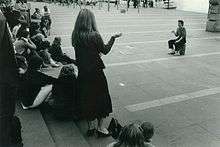Natias Neutert
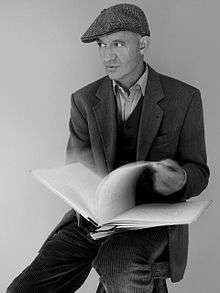
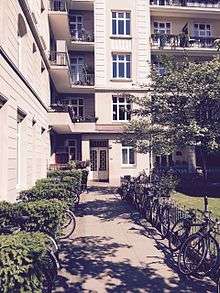
Natias Neutert (spoken: noytərt) (February 24, 1947 in Neusalz (now Nowa Sól, Poland) is a German bestseller author, poet, essayist, orator, translator, editor, curator, and artist, known for innovations on different cultural fields.[1] As Maximilian D'Alumeuse Neutert appears in two novels of the German writer Hubert Fichte: Die Palette (The Palette)[2] and Detlevs Imitationen «Grünspan». (Detlevs Imitations Verdigris),[3][4] Neutert lived and lives, alternating, in Berlin and Hamburg.
Life and career
Early years, college times
Natias Neutert, son of author Günther and typist Brigitte Neutert (born Nessler), grew up with his brother Volker in Hamburg-Eppendorf and later on in borough Lokstedt with his much younger sister Renate. He attended the Rudolf Steiner School. After doing an apprenticeship as graphic illustrator, he studied philosophy, literary studies, and history of art at the University of Hamburg, and afterwards with a fellowship at the Franz Mehring-institute, an outposted section of the University of Leipzig in Berlin-Biesdorf. During the semester break, he hitchhiked crisscrossing Europe, and earned his living as a street magician, conjuring, playing music, reciting own poems and those of others, philosophizing, and telling stories.[5]
1968er-Bewegung
_1968%2C_MiNr_558.jpg)
Neutert was embedded in Germany's 1968er-Bewegung. He was companion of the provos and activist within the German student movement. He vigorously opposed militarism, Vietnam war, and urban demolition, and fought for women's rights. As a conscientious objector, he fled hitchhiking from Hamburg to West Berlin, landed in borough Kreuzberg. Together with Dimitrius Boyksen and Harun Farocki, he squatted the vacant spaces of the former gallery "Zinke" as their temporary waypoint reading their poems and stories publicly.[6] and experimented with drugs.[7][8][9] before he found a twenty-Mark-chamber.
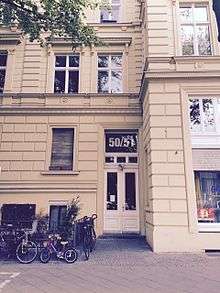
Philosophical standpoint

In 1965 he started extracurricular studies with the focus on philosophy at the University of Hamburg on the so-called ‚Phil-Turm' (Philosopher's Tower), a meeting point of the antiauthoritarian movement. He vehemently avoided any labeling. Instead of the term standpoint he preferred and propagated that of philosophical locomotion.[10] Nevertheless, the traditions are obvious, to which way of thinking he is linked. Above all Nietzsche, with whom he shares not only the strict avoidance of a system,[11][12] but also an affinity to aesthetics, a strong propensity for poetry, art and music. With Walter Benjamin Neutert shares his interest for toys, game-playing, and cultural change.[13][14] The inner core of Neutert's philosophy is freedom and self-definition. He does not accept anything for given. The consequence: Instead of a normal academic final degree, he finished his studies by founding the first Internationale Walter Benjamin Gesellschaft in 1968 in Hamburg. Its purpose: to promote Benjamin into a global prototype of theory of revolutionary change such as Karl Marx, and to combine Benjamin's high-ranking insights with the mass phenomenon of Pop music.[15] During his docentship for Imagination and Invention at the Hamburg University of Applied Sciences[16] Neutert dealt with the freedom, power and variety of imagination, as well as his latest book about the faculty of imagination, titled Wo sind wir, wenn wir im Bilde sind? (Where are we when we are in the picture?).[17]
American influence
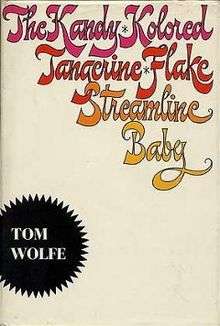
Neutert's early articles for the German weekly newspaper Die Zeit (and later for daily newspapers like Frankfurter Rundschau, Süddeutsche Zeitung and others), were inspired by America's new journalism just as his artistic pursuit has been influenced by the idea of pop art. With Helmut Salzinger and Uwe Nettelbeck from mid-1960s to mid-1970s he was one of the initiators of the so-called German Pop journalism. In the friendly atmosphere of this circle, Neutert created the formula: Pop journalism: entertainment art — without that invisible line, so often separating entertainment and art from each other.[18]
Bestseller as basis of life
The Rowohlt Verlag offered him to write a kid book. For its realization—in a sixty-hours-day-and-night action[19] Neutert could use several capabilities: As a Conjurer he drew on his gimmickry, as an Author, he wrote down the book, as an Artist he illustrated it. And with the variety of his One-Mensch-Theater he promoted it on thousand of performances, firstly on the German-speaking public market in Germany, Austria and Switzerland. In 1982, the English edition of the book came out. Both, German as well as English editions, gave him the financial freedom for broadly conceived artistical and philosophical studies, and for experiments to find out his further very own way as an artist en bloc.[20] The book becamea Bestseller, on a German edition[21] and an English edition.[22] Between mid-1970s and mid-1980s Neutert became first and foremost one of Germany’s praised Comedian’s as Claudia Sautter wrote in a wide run-down within Die Zeit: "When the comedian Natias Neutert (...) conjuring and telling everyday stories (...), then, in such moments flash up the best of the independent theater scene: its wit and its anarchy, its insouciance, and its delight in chaos."[23] Concurrently with this, he evolved into one of the leading figures of Germany’s so-called ‚Freie Theaterszene’ Alternative theatre – sometimes he was named "Marx brothers' grandchild",[24] sometimes as a new Dadaist[25] or, more factually and laconic, One-Mensch-Theater. He toured passing a lot of performance venues in Germany, neighboring countries, and even New York, too.[26]
Translating, free adaption
His three-month stay in New York 1980, he used to act as a life poet, reciter and a translator. Regarding the latter, it was realized not only from English into German, but eccentric enough from German into English,too.[27] albeit only in the field of poetry, which he feels particularly at home. In an interview in the German newspaper Frankfurter Rundschau Anja Juhre-Wright talked with him about his longstanding favorite project translating Gottfried Benn's poetry into English),[28] which is finished meanwhile.[29] Neutert drew astonishing parallels between Benn and Shakespeare: "Both conjure up 'potential words,' as linguists call them, words that could always have been made according to our grammatical rules, but that had never been formulated until then. Once they've been created, nothing stops them from becoming an integral part first of the poem, then of the language. In this respect, Benn was enormously creative when he formed neologisms like 'Seltsamsaft' (curiousjuice),[30] or said 'Mißvertraun' (misdistrust) for the sake of poetic metre“.[31]
Oration
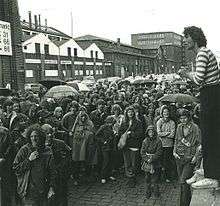
Barely seventy-five percent of his work—whatever it may be, poetry, philosophical essay, and artistic subject matter—is firstly and mostly featured in the form of an open oral session, free talking, generally without any notes. An intellectual game alike "The Gay Science" Nietzschean, including always risk and chance of the factor of fortuity, as an Austrian critic wrote about Neutert's philosophical lecture in Lech am Arlberg in 2003: "Substantially an improvisation, formal a performance."[32] The critic called Neutert an Inspirierender Wortakrobat (inspiring word acrobat).[33] From the first beginning, his artistry showed two skills: linguistic competence and a highly developed ability to speak freely and to improvise[34][35]
Works
Poetry
His poems reach their audience in two different ways: either live, at cultural events in museums, at festivals and at poetry slams or medially as multiples, in literary magazines like Boa Vista, and in anthologies,[36] as recordings in the web[37] on CDs[38] or as a poem clip like »Selbst als Bär« by Dagmar Weiss.[39] Except for a lot of printed poems in form of multiples, faksimiles, and other artworks, Neutert followed Peter Rühmkorf’s personal advice „Make up your choice and bundle your poems to a book!“ just once yet:
- 1977 »Was ist und was sein soll«. Lauter Gedichte mit einem leisen Nachwort von Helmut Salzinger. Edition Karls Ruhe, Karlsruhe.
Manifests, Essays
- 1968 »Mit Walter Benjamin!« (Founding Manifesto of the Internationale Walter Benjamin Gesellschaft). Copyleft Verlag, Hamburg
- 1969 "Die Machbarkeit des Wetters" (The Feasibility of Wether), Cicero Presse, Hamburg
- 1970 "Bausteine für eine polyästhetische Erziehung" (Bricks for a polyaesthetical education). Verlag Einsteins Erben, Hamburg
- 1971 "Adorno ist tot. Der von uns verschiedene Philosoph" (Adorno is dead). Pozzo Press, Hamburg
- 1999 "Dompteur des flüchtigen Augenblicks" (Tamer of the fleeting moment) in: Martin Pudenz: Selbst. Umschau/Braus Verlag, Heidelberg 1999. ISBN 3-8295-6816-9
- 2000 »Shigeru Ban. A Gentle Revolutionary" in: Shigeru Ban Architects/Paper Tube Architecture — 10 Works 1990–2000. Galerie Kammer, Architektur und Kunst/Junius Verlag, Hamburg 2000. ISBN 3-88506-299-2
- 2004 »Das Abwesende, das stets anwesend ist. Die Beunruhigungsfigur des Denkens« (the absence which is always present. The perturbation figure of thinking) in: Ruhm, Tod und Unsterblichkeit (Fame, death and immortality). Ed. Konrad Paul Lissmann, Philosophicum Lech, Vol.7, Paul Zsolnay Verlag Wien, 2004 ISBN 3-552-05299-2
- 2014 »Wo sind wir, wenn wir im Bilde sind? Über Differenziale der Einbildungskraft« (Where are we when we are in the picture? About differentials of imagination). Lilienstaub & Schmidt, Berlin 2014. ISBN 978-3-945003-98-5
Awards, furtherances and honoring
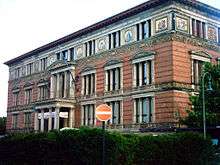
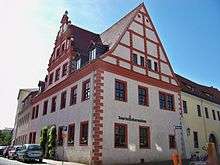
- 1988 Harald Szeemann-Grant for "Sympathie für Piano und Pumpe" at the Martin-Gropius-Bau, Berlin[40]
- 1995 Project promotion by Kulturbehörde der Freien und Hansestadt, Hamburg
- 2008 Visiting poet at the Ringelnatz-Summer, Arkadenhof, Kulturhistorisches Museum, Wurzen
Reception, critic and efficiencies
Neutert started his writing career as a journalist with terse essays for the German national weekly newspaper Die Zeit[41] Neutert’s writing style, marked by lambent digressions and highly self-referential biographical innuendos, influenced subsequently German columnists such as later appearing protagonists as Harry Rowohlt or Max Goldt. A portrait of Neutert during this period is given by the German writer Daniel Dubbe. He describes him under the Kafkaesque majuscule "N" as a charming philophizing discourser, harmonica player,[42] and a tricky connoisseur of the art of living as well.[43] In the field of poetry, he is not only known for the arbitrary interpretation and performance of his own poems, and those of others, too.[44] From the outset of his career, he was active in various artistical fields, using a lot of different media. Until today he follows his credo to combine thinking, poetry and performance.,[45] what literary scientist Ursula Keller commented like this: "Such as him who philosophizes without railings and reasoning and performing while cruising nimbly between all arts: we call a crossover."[46] The work of Neutert, with all its hybrid forms, literary and artistic blendings can be classified only with difficulty, „because of its disparity, versatility and scattered nature“, as American-German critic Rick Weinstein pointed out.[47] Therefore, so he argues, we have to speak of some kind of anti-work.[48] The critic Manfred Sack on the other hand brings the idea of creativity into play: „In fact, he is a creator, but that does not tell you; so we are content with the ,creative man‘, who has a penchant for events, no works are more than the consequence information, but an activity list "[49]
See also
- Gottfried Benn
- Boa vista (literary magazine)
- Pop journalism
- Sympathy (music)
External links
| Wikimedia Commons has media related to Natias Neutert. |
- Literature by and about Natias Neutert in the German National Library catalogue Literature by and about Natias Neutert in the German National Library
- Natias Neutert at perlentaucher.de – das Kulturmagazin (German)
- "Poet Gottfried Benn died fifty years ago". signandsight.com. July 7, 2006.
References
- ↑ Cf. New Art in Europe No 22. March/April 1988.
- ↑ Cf. Hubert Fichte: Die Palette, Roman, Rowohlt Verlag, Reinbek bei Hamburg 1968, ISBN 3499113007
- ↑ Rowohlt Verlag, Reinbek bei Hamburg 1971.
- ↑ See Protest! Literatur um 1968. Marbacher Kataloge 51. Ed. by Ulrich Ott and Friedrich Pfäfflin. Marbach am Neckar 1998, S. 253. ISBN 3-929146-69-X
- ↑ Cf. German weekly newspaper Die Zeit No. 32, 4. August 1978.
- ↑ Cf. interview by Anja Juhre-Wright in Frankfurter Rundschau 7. Juli 2006.
- ↑ Cf. Matthias Penzel/Ambros Waibel: Rebell im Cola-Hinterland. https://books.google.de/books?id=xmg_AwAAQBAJ&pg=PT102&lpg=PT102&dq=Natias+Neutert+über+Hubert+Fichte+in+der+FR&source=bl&ots=cPuG6m_ucp&sig=8jOVsxzbaIPod4-4YuaT7UZbdvw&hl=de&sa=X&ei=InqKVYyeKoaCygP-l7OgAQ&ved=0CEAQ6AEwBQ#v=onepage&q=Natias%20Neutert%20über%20Hubert%20Fichte%20in%20der%20FR&f=false
- ↑ Cf. Hartmut Böhme: Blume zu Saron. http://www-alt.culture.hu-berlin.de/hb/static/archiv/volltexte/pdf/Saaron.pdf
- ↑ Cf. Timothy Brown: West Germany and the Antiauthoritarian Revolt, 1962–1978. Cambridge 2013.
- ↑ Cf. Natias Neutert: Adorno ist tot (Adorno Is Dead). Pozzo Press, Hamburg 1971, p. 9.
- ↑ And with Ernst Bloch too, sharing the "rebellion against any form of constricting systematics". Cf. Natias Neutert: Ent oder weder. In: Die Zeit, 25. Juli 1969. http://www.zeit.de/1969/30/ent-oder-weder
- ↑ Cf. Peter Zudeik: Der Hintern des Teufels. Ernst Bloch. Leben und Werk . Elster Verlag, Bühl-Moos 1987, p. 10. ISBN 3-89151-043-8
- ↑ Cf. Natias Neutert: »Mit Walter Benjamin!« Founding Manifesto of the Internationale Walter Benjamin Gesellschaft. Copyleft Verlag, Hamburg 1968.
- ↑ (Founding manifesto International Walter-Benjamin Society), Copyleft Verlag, Hamburg, 1968, p. 3.
- ↑ Cf. Natias Neutert: »Mit Walter Benjamin!« Founding Manifesto of the Internationale Walter Benjamin Gesellschaft. Copyleft Verlag, Hamburg 1968, p. 3.
- ↑ The former Fachhochschule für Gestaltung.
- ↑ Natias Neutert: »Wo sind wir, wenn wir im Bilde sind? Über Differenziale der Einbildungskraft«. Lilienstaub & Schmidt, Berlin 2014, p. 4. ISBN 978-3-945003-98-5
- ↑ Natias Neutert: »Adorno ist tot. Der von uns verschiedene Philosoph". Pozzo Press, Hamburg 1971, p. 23.
- ↑ Natias-Neutert-Nachlass-zu-Lebzeiten-Archiv vom 17. Januar 2016. Nachlass-zu-Lebzeiten-Archiv@natias-neutert.com
- ↑ Cf. Laura von Spreckelsen: Grenzübertritte in: Nike/New Art In Europe No 22., 6th volume March/April ’88.
- ↑ Natias Neutert: 100 Tricks und Zaubereien, 1th edition in 1976 -10th edition in 1993. Rowohlt Verlag, Reinbek bei Hamburg, ISBN 3-499-20119-4.
- ↑ Natias Neutert: You Can Make Magic, Angus & Robertson, London/Canberra 1982. ISBN 0-207-14843-0
- ↑ Translated from German. Cf. Claudia Sautter: Bühne – frei! In: Die Zeit, no. 40, 30. September 1983. http://www.zeit.de/1983/40/buehne-frei/komplettansicht the resident
- ↑ Cf. Konkret No 6/1981
- ↑ Cf. Sender Freies Berlin, 11. 04. 1979.
- ↑ Cf. f. e. Natias Neutert: Nachtstück in New Orleans-Clip. https://www.youtube.com/watch?v=JZRzE5Naqg0&feature=related
- ↑ Cf. Natias Neutert: »Foolnotes«, Very Best German Poems. Bilingual edition, Smith Gallery, Soho New York 1980.
- ↑ Cf. Latent existierende Wörter (Latently existing words). Interview with Anja Juhre-Wright in Frankfurter Rundschau, 07. 07. 2006 http://www.signandsight.com/intodaysfeuilletons/841.html
- ↑ Cf. Natias Neutert: Songs From Afar—Bridging Benn Into English. Open lecture at »Leipzig liest« at Leipzig Book Fair http://www.lofft.de/web/archiv.php?nr=510&mode=title
- ↑ Instead of this, however, Neutert used strange sap, to keep thoughtful a more medical connotation and Gottfried Benn's alliteration. Cf. Natias Neutert: Songs From Afar—Bridging Benn Into English. Open lecture at »Leipzig liest« at Leipzig Book Fair http://www.lofft.de/web/archiv.php?nr=510&mode=title
- ↑ Cf. Latent existierende Wörter (Latently existing words). Interview with Anja Juhre-Wright in Frankfurter Rundschau, 07. 07. 2006 http://www.signandsight.com/intodaysfeuilletons/841.html
- ↑ Cf. Der Standard, Wie man sich ein Nachleben sichert (How one secures a survival himself). In: Der Standard, Vienna, 19. September 2003.
- ↑ Cf. Leipziger Volkszeitung, 08. June 2009.
- ↑ Cf. Josef Singldinger: Die Lust zum Improvisieren (The delight to improvise) in: Theater Report, Hamburger Morgenpost, 06. March 1981.
- ↑ Natias Neutert: »Abwehrzauber«. https://www.youtube.com/watch?v=9QZZa2YEgmw
- ↑ Cf. in Tagtäglich. Gedichte. Joachim Fuhrmann (Hrsg.) Rowohlt, Reinbek bei Hamburg 1976, ISBN 3-499-20135-6 , in Lyrik-Katalog Bundesrepublik. Gedichte, Biographien, Statements. Hrsg.: Jan Hans, Uwe Herms, Ralf Thenior. Sammlung Moderne Literatur. 4. Aufl. München [1978] 1981, ISBN 3-442-07017-1 or in Fahrradspaß. Geschichten und Gedichte. Ausgewählt von Alexander Kluy. Reclam Verlag Stuttgart 2014, ISBN 978-3-15-010976-2
- ↑ Cf. f. e. "Abwehrzauber" (Defensive Magic) https://www.youtube.com/watch?v=9QZZa2YEgmw
- ↑ Cf. »Zwei Genies in einem Haus«. Inpetto Hörbuch, Lilienstaub & Schmidt
- ↑ https://www.youtube.com/watch?v=ZFZ1b19E8Rkne
- ↑ Sympathy
- ↑ Cf. Natias Neutert: Ent oder weder , in: http://www.zeit.de/1969/30/ent-oder-weder
- ↑ Concerning this hear the last passage of his performance piece "Nachtstück in New Orleans" https://www.youtube.com/watch?v=JZRzE5Naqg0
- ↑ Cf. Daniel Dubbe: Szene, Prosa. quer-verlag Uwe Wandrey, Hamburg 1973 pp. 31–33, 35–38, 65.
- ↑ Cf. Natias Neutert verbessert Robert Gernhardt (Natias Neutert improves Robert Gernhardt) https://www.youtube.com/watch?v=R0WrpAMPrhU
- ↑ Cf. Kunst und Philosophie (Art and Philosophy). In: Hamburger Abendblatt 14. June 1985.
- ↑ Ursula Keller: Introduction, Literaturhaus Hamburg, 2001.
- ↑ Translated from German. Cf. Rick Weinstein: "In die Knie. Natias Neutert im Kunst Büro Berlin". In: Die Tageszeitung (TAZ), O4. March 1988.
- ↑ Translated from German. Cf. Rick Weinstein: In die Knie. Natias Neutert im Kunst Büro Berlin. In: Die Tageszeitung, 04. March 1988.
- ↑ Translated from German. Cf. Musical Performance Piano and pump in Die Zeit no. 40, September 30, 1988.
